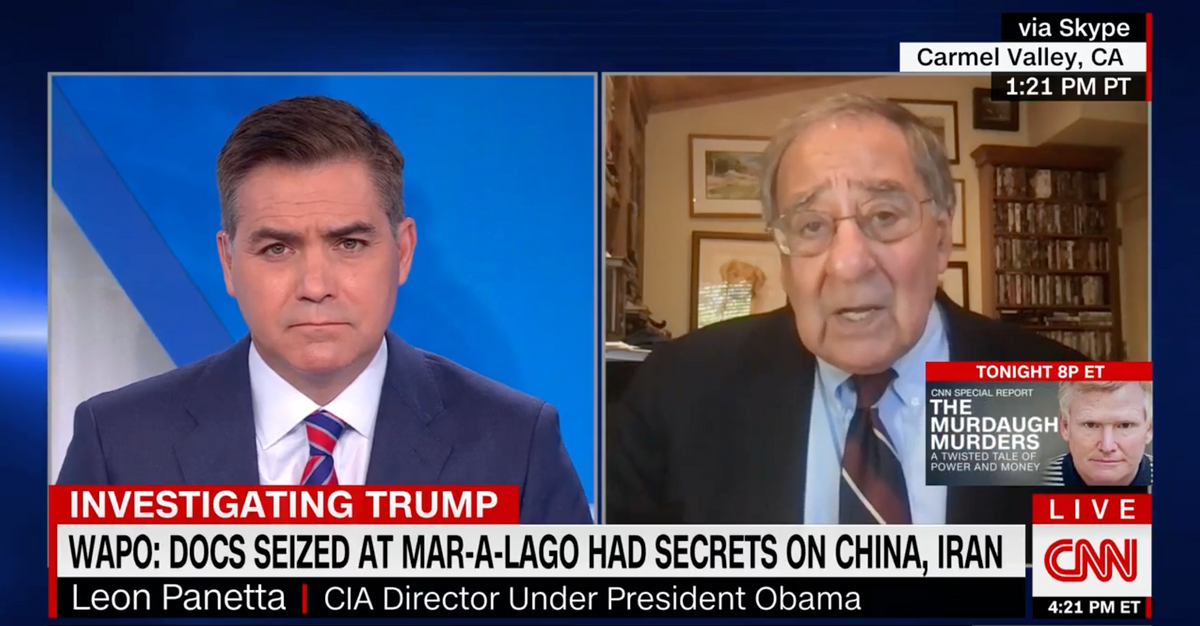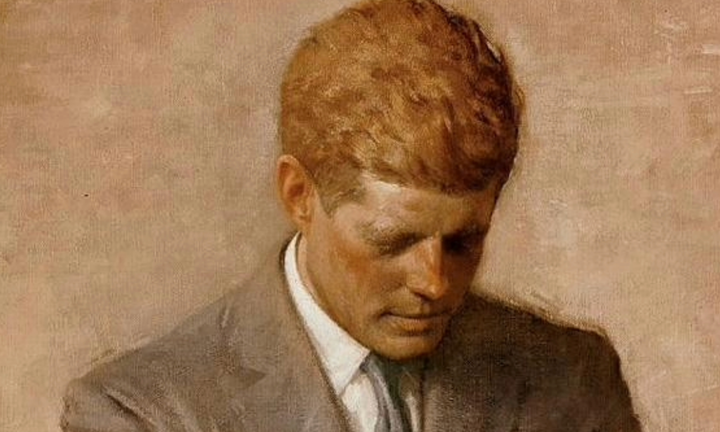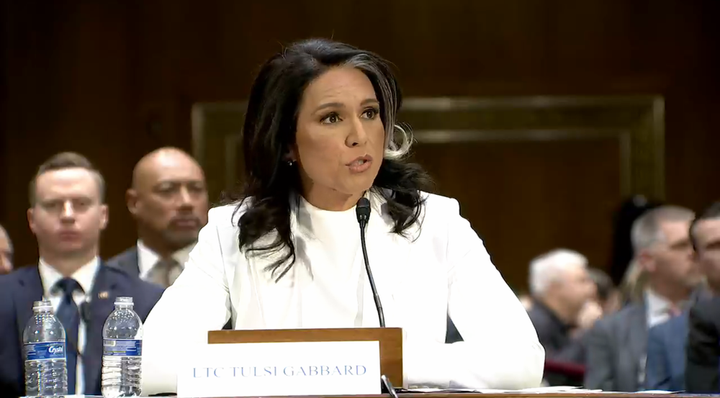Former CIA Director Says Prosecute Trump Like Snowden

This article was funded by paid subscribers of The Dissenter Newsletter. Become an annual paid subscriber to help us continue our independent journalism.
Former CIA director Leon Panetta contends that former President Donald Trump should be “held accountable” and charged with violating the Espionage Act like NSA whistleblower Edward Snowden.
Trump’s alleged actions are meaningfully different than Snowden’s actions. Yet under the 1917 law that the United States Justice Department (DOJ) has depended upon to enforce the security classification of information, the difference is inconsequential to prosecutors.
This is why there have been calls to—at minimum—reform the Espionage Act in order to establish a public interest defense for those who face charges under the law. So abusing one’s access to classified information may be distinguished from someone who blows the whistle on illegal and unconstitutional acts by US security agencies.
A Washington Post report published on October 21 referred to two people familiar with the investigation into Trump, who claimed the documents the FBI retrieved included files that “described highly sensitive intelligence work aimed at China.” They also indicated one document involved “Iran’s missile program.”
On October 23, CNN host Jim Acosta asked Panetta, “At the end of the day, do you think Trump has to be prosecuted for this?”
“There is no question that he has violated security laws and the Espionage Act, and he should be held accountable,” Panetta answered. “You know, people are held accountable. Snowden, who revealed classified information, is hiding in Russia because if he came to the United States he would be held accountable for revealing classified information.”
“So the only way to basically secure classified information is to enforce the laws that are in place that require that you handle classified documents in a specific process and procedure,” Panetta added.
Snowden is still in Russia because documents exposing the NSA’s mass surveillance of US citizens, which sparked debates and spurred modest intelligence reforms, did not translate into a push within the US political establishment to welcome a whistleblower back to his home country.
Instead, people like Panetta have been openly hostile to Snowden, and they’ve helped illustrate why Snowden is right to believe he would not receive a fair trial and should stay with his family in Russia.
Unlike Snowden, Trump effectively stole documents that were supposed to go to the National Archives and Records Administration (NARA), and no matter what he says about their contents, the documents were never shared with the public. The files were not even provided to a friendly right-wing media organization to potentially expose the “deep state” and what Trump perceived as a war on his presidency.
Trump kept them for his own personal benefit, which is in line with his history of rank corruption.
When Panetta Leaked Top Secret Information
Panetta moralized on how those with security clearances in the White House are expected to follow “strict procedures” when handling classified information.
“You had to basically log those classified documents in, and you had to make sure that even if the president had access to those documents that they were returned,” Panetta said. “None of that seems to have taken place in the Trump administration and for that reason security laws have without question been violated.”
Panetta is one of the last former officials who the news media should be inviting on television to recite classified information guidelines and procedures. He leaked sensitive details about Seal Team 6 and the raid that killed al Qaida leader Osama bin Laden to the filmmakers behind “Zero Dark Thirty.”
Mark Boal, the screenwriter for “Zero Dark Thirty,” was at a classified CIA awards ceremony in June 2011 for personnel involved in the operation. His invitation was authorized by the Office of the Director of Central Intelligence. Panetta gave a speech containing top secret information and then was dishonest about whether he knew Boal would be in the audience.
“The inspector general identified several potential criminal violations of federal law — Panetta's unauthorized disclosure of classified information to Boal, and a separate federal violation of transmitting or losing of defense information,” journalist Jason Leopold reported. “
“Additionally, the inspector general identified as a potential violation of federal criminal law the bribery of public officials and witnesses by [director Kathryn] Bigelow and Boal,” added Leopold. “The cases were referred to the Justice Department for criminal prosecution, but [the DOJ] declined to prosecute in favor of ‘administrative action’ by the CIA.”
Plus, let’s not omit the role that “Zero Dark Thirty” played in advancing a false narrative that—despite a study from the Senate Select Committee on Intelligence—torturing detainees in the Global War on Terrorism had worked.
The CIA's Sloppiness, Not Leaks, Have Cost Lives
Leaks might pose risks to the safety of undercover officers or informants working with the CIA. Usually the panic that follows leaks is overwrought. However, lax security could also present risks and result in the detention and executions of individuals who provided intelligence to the agency.
Panetta said of Trump, “It's extremely concerning to have that kind of classified information being treated the way it is, and I'll tell you why, Jim, because lives are at stake.”
“This information [about China or Iran] doesn't fall from the sky,” Panetta maintained. “It takes spies who are well-located in key positions. It takes very sensitive operations to be able to discover this kind of information, and if you're careless with the information, the danger is that it's going to jeopardize the lives of those who are seeking that kind of intelligence.”
But Panetta was CIA director from February 13, 2009, to June 30, 2011, when he left the position to become the head of the Pentagon. For part of his tenure, the CIA was in the middle of one of the worst intelligence failures in US history, where networks of informants in China and Iran were exposed to danger.
William Neuheisel, a human rights and civil liberties advocate for the Whistleblower and Source Protection Program at ExposeFacts, wrote about the significant lapses in tradecraft that were detailed in a series of articles from the New York Times, Foreign Policy, and Yahoo! News. It occurred as the DOJ ramped up its war on whistleblowers for exposing “sources and methods.”
Essentially, the CIA had set up a system to embed a messaging function hidden in the search box of hundreds of cheaply produced fake websites. The word “hidden” should be used loosely here — the new Reuters reporting found more than three hundred of the sites and showed that a cursory look at their publicly available HTML source code revealed labels such as “message,” “compose,” and “password.” And because the agency purchased the domain names in bulk, the websites were assigned sequential IP addresses — making it almost trivially easy to identify the whole network once a few were discovered.
In other words, simply entering the correct operators into a Google search might have led to dozens of informants rounded up and executed. This level of sloppiness is deeply shocking and inexcusable for a spy service with the resources and expertise available to the CIA. But there are additional layers of hypocrisy and bitter irony that have been less discussed.
As Neuhisel put it, in Espionage Act cases the US government “claimed to assign the gravest weight to the protection of sources—so much so that no concern of public interest, no matter how great, could ever be weighed against the secrecy.” However, the CIA could not be “bothered to obscure the HTML on its communications system” to protect sources.
Panetta and any former US official who ever possessed a security clearance which gave them a peek at the family jewels are wrong about the need for prosecutions to safeguard classified information. Punishment does not prevent leaks because Snowden is not a typical leaker.
The people who do most of the leaking are former senior officials like Panetta, who prosecutors will never make an example out of when they talk with reporters.
In fact, the news media is only talking about the Justice Department prosecuting Trump because there is a battle among elites over how to handle a former US president, who did not share their same devotion to following the national security state’s rules.
If it was any other former US president, former officials would have an entirely different response. The message in their cable news appearances would be that the US government should move forward without looking backward, which is how President Barack Obama handled individuals in President George W. Bush’s administration who were responsible for CIA torture and NSA warrantless wiretapping.



Comments ()